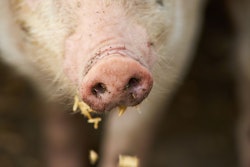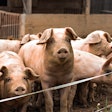
First reports of African swine fever brings the number of Asian countries affected to 13
African swine fever (ASF) has been detected in Papua New Guinea for the first time. The disease has also spread in wild boar to new counties in South Korea, and it has returned to Inner Mongolia in China.
With confirmation this week of the disease in Papua New Guinea, the number of Asian countries affected by ASF since 2018 has risen to 13.
Official report to the World Organization for Animal Health (OIE) puts the number of outbreaks at four. These formed a cluster in four villages in the province of Southern Highlands, according to the country’s animal health authority. Outbreaks began at the start of March, and affected 700 free-ranging pigs, of which almost 400 died. Confirmation tests for the virus were completed last week.
This is the first occurrence of ASF in Papua New Guinea, and the source of infection is unknown.
Located in Melanesia — a sub-region of Oceania — Papua New Guinea covers the eastern part of the island of New Guinea as well as archipelagos to the east. The western part of New Guinea belongs to Indonesia.
More than 1,500 pigs have already died of ASF in the municipalities of Mendi, Upper Mendi and Nipa, reports Post-Courier. Pigs have been dying in the area for three months, according to a local community leader.
Disease control measures are being put in place by the National Agriculture Quarantine and Inspection Authority (NAQIA). It estimates the cost of a local ASF control program at PGK2 million (US$584,000), which compares with a nationwide approach costing PGK18 million.
Initial focus of the program will be in Mendi, and then be rolled out into neighboring areas. Another task force will focus on the removal of unauthorized products from food stores, and X-ray machines will be set up in border areas to check imported products, particularly from Indonesia.
China blames illegal movements for latest ASF cases
In Sichuan province, highway checkpoints have identified two more consignments of pigs that have tested positive for the ASF virus, and were being transported without the correct documentation. These were stopped in the city areas of Leshan and Guangyuan, according to the official report to the OIE from the agriculture ministry. In total, 211 animals were affected, with a few pigs found dead and the rest were destroyed.
This month, ASF-infected pigs were picked up in another highway check in Leshan, and a village pig herd tested positive for the virus in another part of Sichuan.
China’s ministry has also informed OIE of the return of ASF to Inner Mongolia, an autonomous region in the north of the country. The presence of the virus was confirmed after 105 pigs at a farm in the Ordos city region showed signs of disease. The remaining 108 animals have been destroyed. As with the latest cases in Sichuan, Chinese authorities blamed the latest outbreak on illegal pig movements. The ASF virus had not been detected in Inner Mongolia since May 2019.
ASF has also returned to Gansu province, according to China’s agriculture ministry. On its website, the ministry confirms ASF at two locations near Longnan city. First was at a cooperative farm that had brought in pigs from another province, contrary to current movement restrictions. Around half of the new arrivals died, along with 72 out of the 106 original pigs.
The other outbreak in Gansu was revealed during a highway check of around 110 pigs. Four of the animals were already dead, and most of the rest died during the quarantine period, according to the ministry.
ASF spreads to new areas on South Korea
For the first time, ASF virus has been detected in wild boar in the counties of Yanggu and Goseong. These are both in Gangwon, a province that borders North Korea, and where there have been many previous cases of ASF in wild boar.
Over the past week, South Korea’s agriculture ministry has confirmed 50 new cases of ASF in wild boar to the OIE. The majority of these animals were found in Yeoncheon county in Gyeonggi province, and Hwacheon in Gangwon.
There have been 467 cases of ASF in wild boar since September 2019, according to the latest report from Yonhap.
View our continuing coverage of the global African swine fever situation.


















